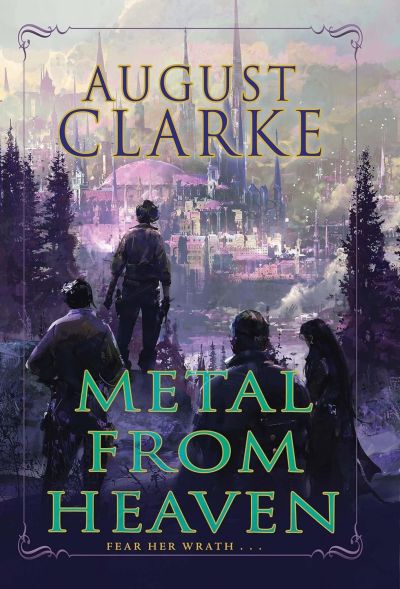Know Your Enemy
Metal From Heaven
By August Clarke

17 Oct, 2024
August Clarke’s 2024 Metal From Heaven is a stand-alone secondary universe industrial fantasy.
Ichorite is a marvelously useful material, the production of which has given Yann Chauncey and his family a considerable fortune. Ichorite is toxic; its fit-prone victims are known as the lustertouched. When Yann’s workers demand that Yann acknowledge the issue and do something to mitigate it, Yann does the only reasonable thing an oligarch in his position could do. He orders the protesters slaughtered.
The massacre is almost complete. Yann’s hired killers miss lustertouched Marney Honeycutt, an oversight that will have significant repercussions later.
Marney’s flight crosses the path of the Choir, robbers and bandits in the name of social justice. The Choir accept Marney into their fold, in part to shore up their numbers — banditry being a hazardous profession — and in part because along with the obvious drawbacks of being lustertouched, the condition comes with certain magical gifts, gifts with which Marney is adept.
Marney grows from a girl to an infamous bandit under the Choir’s tutelage. She takes to banditry with considerable enthusiasm and even more skill. This is for Marney a short-term goal. She never forgets her vow to murder Yann for killing her family.
The Choir persists in part because the Choir’s allies have a refuge whose existence nobody suspects: the manor of Fingerbluffs. Fifteen years earlier Baron Loveday and his family were murdered by their servants. Even since then, the workers have kept up the pretense that Loveday is still alive. Conservative, anti-social Loveday isn’t the sort of man who would provide shelter to bandits.
This pretense always had a time limit. Even though Fingerbluffs is a backwater, and Loveday so tremendously inconsequential that his murder could go unnoticed for almost generation, at some point the ruse would be exposed, soldiers would descend on Fingerbluffs, and all present massacred. Now that day is coming closer, thanks to some very bad luck.
The plan was to buy more time by sending off Loveday’s daughter Velma Truth Loveday to briefly visit civilization, just long enough to establish that Velma existed. The imposter would then feign madness and retreat back into isolation. Candor has trained for years to pass herself off as the long-dead Velma. Before Candor can carry this off, she is killed.
Having trained to pass herself off as Candor’s servant, Marney is promoted to the lead role. If Marney is up to the task, the ruse will provide her with the assassination opportunity she craves. Industrialist Yann (murderer of her family) seeks a suitable spouse for his heir, Gossamer Dignity Chauncey. The Lovedays have an ideal combination of title, land, and financial desperation; it’s quite plausible that they’d stoop to marry Velma to the heir of an industrialist.
All Marney need do is pass as a half-mad aristocrat, ingratiate herself to the moneyed classes, seduce Gossamer Dignity Chauncey, and assassinate Yann. What could possibly go wrong?
~oOo~
The ad copy proclaims that this book will be enjoyed by “fans of The Princess Bride and Gideon the Ninth.” I can see why they mention Gideon, as this novel is wall-to-wall violent lesbians, but the Princess Bride reference eludes me.
I couldn’t think of an elegant way to mention this in my opening synopsis, but while the setting is in many ways modeled on 19th century Britain, society is on the whole far more accepting of same sex relationships than it was in the Victorian era. Provided, that is, that aristocrats nevertheless fulfill their duty to produce heirs.
Clarke makes an interesting stylistic choice in this novel, one that may well feature prominently in reviews. The entire book is narrated to a particular person, not the reader. To whom Marney is telling her tale is revealed later in the novel.
Otherwise, the plot is made up of one part social activists driven by passion, righteousness, and jet-fueled libidos, and one part real life consequences. As is apparently from the beginning, having great justice on one’s side does not matter half as much as having armies of heavily armed soldiers. Each robbery rolls the dice. Rob enough gentry and eventually the dice come up snake eyes.
The bandits do understand they’re all doomed and that they are unlikely to effect any lasting reforms. All of the other choices are worse. This isn’t the most upbeat novel I’ve read in 2024.
I found it interesting that certain elements of the story that would in many other books have ensured triumph do not in this book. Marney’s trauma inspires her. Often, it inspires her to make bad decisions. Marney has a tremendous capacity for passionate infatuation matched by a talent for seduction, but falling for the mark is never a good idea. Finally, while it turns out that many upper-class women chafe at the restrictions placed on them, and some even dabble in reform, this does not mean that Marney can use a well-turned ankle to transform her new acquaintances into revolutionaries. In the end, class loyalty trumps all other considerations.
The plot moves along briskly and while I wouldn’t exactly call the characters endearing — they’d probably beat me to death with a bar-stool if I did — readers may well wonder, with horrified fascination, what horrendous decisions the characters will make next. Decisions that follow organically from the sociopathic self-interest of the upper classes and also from the many traumas to which most characters have been subjected.
Metal From Heaven is available here (Amazon US), here (Amazon Canada), here (Amazon UK), here (Apple Books), here (Barnes & Noble), here (Chapters-Indigo), and here (Words Worth Books).
